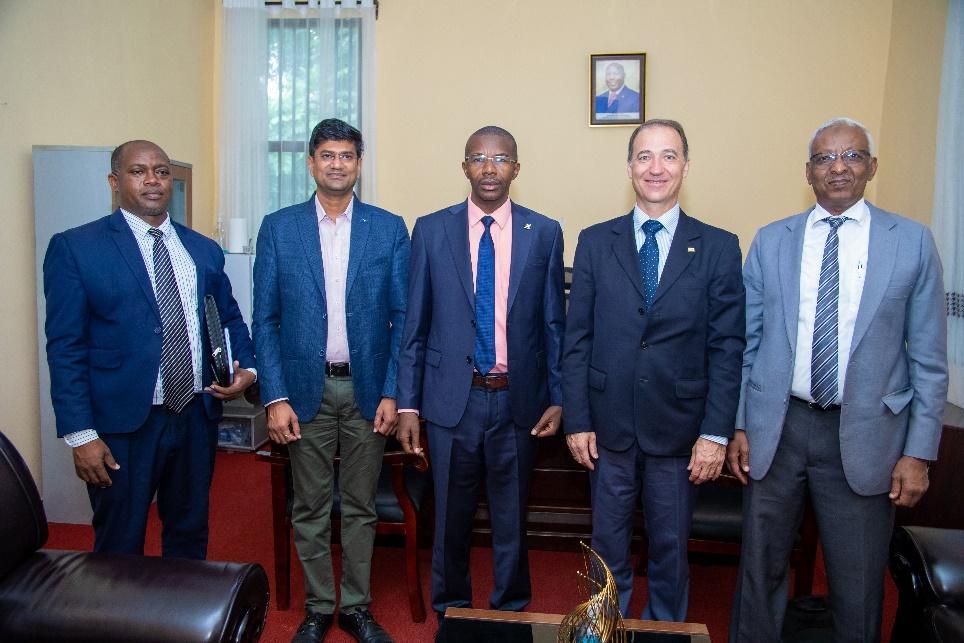To strengthen the partnership between the International Rice Research Institute (IRRI) and Burundi, IRRI Director General Dr. Jean Balié visited the IRRI-Burundi office from December 10-11, 2022. The visit underscores IRRI’s active role in the development of the rice sector of the country, and of the Sub-Saharan African region.
During his visit, he met with the Minister of Environment, Agriculture and Livestock, the Permanent Secretary in the Ministry of Foreign Affairs and Development Cooperation, the Director General of ISABU (Institut des Sciences Agronomiques du Burundi / Burundi Institute of Agricultural Sciences), the Director General of SRDI (Société Régionale de Développement de l’Imbo / Imbo Regional Development Corporation), and the Rector of the National University of Burundi.
IRRI DG Dr. Balié acknowledged the high level of collaboration between IRRI-Burundi and its partners, the recognition and trust partners are displaying for IRRI which is the basis of good success as he stated, “Success is not possible without partnership.”
The IRRI Director General was accompanied by Dr. Abdelbagi M. Ismail (Principal Scientist and IRRI - Africa Representative) and Dr. Ajay Panchbhai (Regional Breeding Lead - East and Southern Africa Seed Systems and Product Management Lead - Africa) during his stay.

The partnership of IRRI and the Burundi government goes way back in 2008, when a memorandum of understanding (MOU) was signed. The second MOU signed in 2013 resulted in the establishment of the IRRI-Burundi Office as a Regional Office and a breeding hub for East and Southern Africa. In 2018, a diplomatic status was granted to IRRI which was therefore registered as an International Organization governed by a Host Country Agreement with the Government of Burundi.
In the breeding section, forty (40) rice varieties have been released in East and Southern Africa from which, nineteen (19) are from IRRI-Burundi. A Crop Protection Community of Practices in Sub-Saharan Africa (CPCoP – SSA) including thirteen (13) countries was initiated under the pathology section of the hub.
Since IRRI-Burundi Office was established, 82 researchers and 126 technicians benefited from non-degree training sessions, while 198 interns from different universities spent two to three months in IRRI’s fields and laboratories for their thesis. Two PhD and four MSc scholars have also been sponsored.
Apart from this, 38,000 farmers have been trained in rice production technologies, among which 55% were women. Despite an increase of 2 tons per hectare that has been estimated from 2008 to 2021, much work needs to be done as Burundi still imports 20% of its rice needs due to the increase in population and consumption rates.
The recent visit also highlighted a set of goals of the partnership between IRRI and Burundi. These goals include:
-
To make sure that IRRI stays aligned with His Excellency the President of the Republic of Burundi when he stated, “each mouth has to get food and each pocket has to get some money.” Rice should be a platform to transform the lives of farmers’ families and all communities depending on them.
-
Gender inclusion: all communities need to understand the critical role of women in the rice production system and try to empower them.
-
Sustainability in the midst of climate change: make sure to have varieties that would cope well with stresses.
-
To focus on the transformation of agriculture, that is the new technologies the country may need to face the current challenges.
-
Need to strengthen the capacity-building aspect with our partners.
-
Set up a mechanism to regularly assess the state of the cooperation between IRRI-Burundi and its partners.

